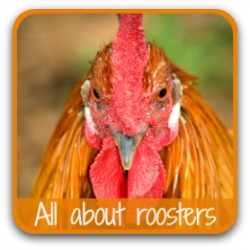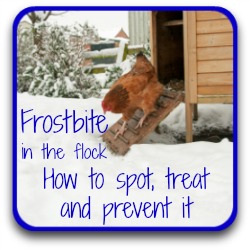How to deal with an aggressive rooster.
He began life as a cute ball of fluff, then a gawky teenager. Now he's turned into a raging ball of fury.
What happened? And what can you do about it?
In this article, we'll look at why roosters (UK cockerels) become aggressive, when it's likely to happen, whether breed has anything to do with it, and what you can do about it.
Why is my rooster suddenly aggressive?
It's a hormone thing.
A male chicken (US rooster; UK cockerel) is normally as friendly as any other chicken until the chicken version of puberty.
Then, like any teenager, hormones kick in and the once cute and fluffy rooster suddenly decides he must do what a good rooster is meant to, and protect the ladies in his flock.
At what age will a rooster become more difficult to manage?
It varies from one bird to another, but generally speaking watch out for a change in behaviour between nine and twelve months old.
By then your rooster will have started to crow and assert his authority. Becoming "aggressive" is another way of doing the same thing.
This is Julius Caesar, my Black Copper Marans rooster who I hatched myself. Within a year, he turned from a lovely, friendly chick to a monster whose aim in life was to damage me as much as possible.
 Julius Caesar, my Black Copper Marans rooster, at one week and one year old.
Julius Caesar, my Black Copper Marans rooster, at one week and one year old.Suddenly you, who have raised him lovingly, fed and cared for him, become the enemy, just like any other predator. Because, who knows, you may want to steal away his hens.
There's evidence of that because, every day, you collect delicious eggs from the coop.
And from a rooster's point of view, that's stealing his would-be children.
Are all roosters aggressive?
No. It doesn't depend on breed, either. It's simply a question of hormones.
Unlike Julius Caesar, my Golden Laced Wyandotte rooster, Spartacus, was always a perfect gentleman with his hens, and with me.
He would offer them food before touching it himself. He found them the shadiest spot in the heat of the summer. He watched over them while they dust-bathed. He guarded them against predators.
And he never saw me as the enemy. He seemed to see me as the food-bringer, and therefore someone to be welcomed.
 Spartacus, my Golden Laced Wyandotte - always on guard for his hens!
Spartacus, my Golden Laced Wyandotte - always on guard for his hens!What are the signs a rooster is about to attack?
A male makes it pretty obvious when he's feeling the need to protect the flock aggressively. These are the signs to look out for:
Raised hackle feathers: the feathers around the rooster's neck raise as he tried to make himself look bigger than he is.
Wing flapping: he'll start to beat his wings for no apparent reason. This will last just a few seconds and again, it's a way of making himself appear bigger than he is.
In this picture, my tiny Lemon Millefleur Sablepoot bantam rooster does both to make himself look as large as possible when faced with Luce, my Maremma Livestock Guardian Dog.
Luce is, as ever, totally unimpressed.

Head shaking: he'll waggle his head from side to side, while keeping his eyes fixed on the object of his annoyance.
 Spartacus warns me he's not happy.
Spartacus warns me he's not happy.Foot stamping: this is the moment when it's time to either take flight, or deal with the behaviour. Because shortly after this, the rooster will start...
Using his spurs: roosters attack by launching themselves, feet first, at the object of their attack. The spurs at the back of their leg, if they're allowed to grow, are razor sharp and capable of inflicting severe damage.
How not to deal with an aggressive rooster.
A lot of chicken keepers you'll see on various websites and forums will advise that an aggressive rooster should be "taught who's boss" by either kicking him, hurting him in some other way or putting him in the pot.
If that's you, the rest of this article is not for you.
Speaking personally, I don't eat my own chickens. I do acknowledge, though, that for some people that's simply a part of raising chickens, and there are humane ways to kill a chicken which don't cause suffering. It's simply a personal choice, and I choose not to.
Spur removal: is it cruel?
Some people clip or remove the male's spurs altogether.
There is a blood supply in the rooster's spur which, because of the toughness of the outer sheath, isn't easy to see. So clipping the pointed end off the spur can be done but can cause pain if the blood vessel is caught.
If you're going to try this, make sure you have corn starch available to stem the blood should you catch it.
 Rooster spurs - impossible to see where the blood supply ends.
Rooster spurs - impossible to see where the blood supply ends.Removing spurs altogether is not something I'd recommend. It's done by either twisting off the outside sheath, or covering the spur with a hot potato to weaken it, and then pulling off.
It leaves the soft inside of the spur exposed and sore. It also leaves the rooster without protection should he be faced with a predator.
There are ways of dealing with roosters which don't involve either cruelty or killing. Here are some of them.
How to deal with an aggressive rooster: understanding.
I know, it sounds crazy. You're attacked by one of your flock and I expect you to forget the pain and say thanks.
Well, not quite. But it is important to understand why a rooster behaves like this. It's not that he hates you. He may seem aggressive to you but from a rooster's point of view, he is simply defending his hens. It's his job.
 Julius Caesar, my Black Copper Marans rooster - lethal to me but a great protector of his hens!
Julius Caesar, my Black Copper Marans rooster - lethal to me but a great protector of his hens!And a good rooster can be invaluable to a flock in terms of being the last line of defence against predators. There are numerous stories of males defending their flock by giving up their own life.
So if you can find ways of managing the behaviour, why wouldn't you?
Is it possible to tame a chicken not to become an aggressive rooster?
Many people are convinced that handling a chick immediately after hatch and regularly through its brooder time and beyond means it will grow up to be calm and friendly.
Personally, that's not something I've experienced. I've spent hours sitting in my large puppy pen brooder with chicks, in their "grow-out" run feeding them healthy treats during their teenage years, and hanging out in their run as adults, only for them to attack me mercilessly once those hormones kicked in.
 One of my war wounds - my Black Copper Marans rooster drew blood from my ankle.
One of my war wounds - my Black Copper Marans rooster drew blood from my ankle.Does making friends work?
Handling a baby chick, carrying an adult who's become aggressive in your arms and, if possible, keeping an adult near you while you work in the garden or office may work for some.
It's certainly worth a try.
How to calm an aggressive rooster: flipping.
Catching a rooster who's either displaying signs that he's on the edge of attacking, or immediately after he has, and holding him upside down, is another possible way of calming him.
I'm not talking about holding him upside down by the legs, which will hurt and can damage the chicken irreparably, but flipping his body upside down and holding it in your hand or, for a large breed, rested against your arm.
I've certainly fund this works with my bantam roosters. Bono, for example, my Lemon Millefleur Sablepoot, was always having a go at someone.
 Bono in disgrace - again.
Bono in disgrace - again.Catching him was relatively easy, being small and not very fast, and keeping him upside down for five minutes or so did calm him and seemed to stop him trying again for a couple of days.
He did need reminding again after the initial embarrassment had worn off, though.
Does calming roosters by flipping work?
Yes, but they'll probably need this repeating frequently. Chickens aren't known for their long-term memory.
How to control an aggressive rooster: what's worked best for me.
It's so simple I don't know why others haven't tried it.
Water, squirted at the advancing rooster from a hosepipe. Simple as that.
I keep a hosepipe attached to the tap (faucet) in my chickens' run. The other end has an nozzle attachment which means I can leave the water turned on without it leaking until I want to use it.
Leaving the nozzle end inside the gate to the run means I can pick it up as soon as I go inside.
The hens are fine with it. In fact, they've come to view the hosepipe as their friend.
 My Red Star hens love the hose pipe coming out - the roosters hate it!
My Red Star hens love the hose pipe coming out - the roosters hate it!I needed to squirt my roosters every time they started to display any signs of aggression for about three consecutive days before they learned they would not win in a battle between them and my trusty hosepipe.
After that, I didn't even need to use it. I only had to move towards it for them to turn tail and run as fast as their little legs would carry them - in the opposite direction.
Water treatment: is it cruel?
No. Chickens don't choose to be on the receiving end of a water stream, but it doesn't hurt them.
Does the water effect work with an aggressive rooster?
It absolutely does for me. Simple but very effective, a hose works best but if you don't have a tap in or near your run, try using a watering can.
The perfect solution. Definitely worth investing in some hose pipe for!
 My Black Copper Marans, Julius Caesar, turns tail at the sight of the hosepipe!
My Black Copper Marans, Julius Caesar, turns tail at the sight of the hosepipe!














